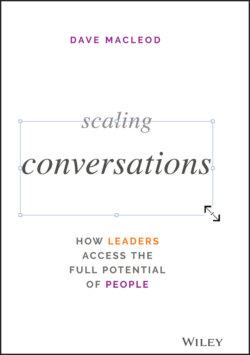Читать книгу Scaling Conversations - Dave MacLeod - Страница 16
Ownership Capital: Don't engage, unify
ОглавлениеOwnership capital is best understood by considering the difference between engaging and unifying. This type of capital is generated by providing people with as much agency as possible, aka freedom of choice, despite structures of influence such as perceived seniority, gender, ethnicity, ability, etc.
The difference between engaging and unifying is important. The idea that leadership needs to “engage” people has within it a core assumption that the people they are engaging, aren't. Put yourself in the shoes of someone who a leader is trying to “engage” with. How does it feel to be told you are being offered an opportunity to “engage” with your place of work? Or that you need to be more “engaged” with your child's education? Or thanks to a communication initiative you now have a chance to “engage” with your community? I'll venture that it feels belittling and a little patronizing. Most people I know already feel pretty engaged in their day‐to‐day work, engaged with their children and with their community. Their leadership are more likely to be the ones who are out of touch and not engaged. While it is admirable for a leader to be motivated to more deeply engage people to increase their feeling of ownership and agency in their organization, it is helpful to adjust the intention as well as the language to: Unification.
Great leaders understand that, rather than engage the disengaged, their job is to unify the existing intelligence, passion, and efforts of their people with the most effective direction of the organization. Rather than engage people with surveys and focus groups to attempt to achieve ownership, it is more effective to remove the assumption of disengagement and work to unify their intelligence and effort with yours by asking for their voice in ownership decisions.
It is also important to recognize that ownership is not limited to material things. It can apply to ideas, missions, visions, etc. Of course, it does apply to material things as well. People feel very strongly about their budgets, their physical environment, their benefits, their compensation, etc.
Creating ownership capital can be achieved by sharing challenges with people and asking for advice. Notice I said advice, not feedback or input. Advice is something you ask for from people you trust. Feedback is something you ask for from people who you are trying to engage. It may sound like semantics, but words matter.
Here are some questions leaders have asked to earn ownership capital. Notice they are asking for people's voices in decisions that materially affect them while not creating a false sense of democracy, or a sense of abdicating leadership. (I'll cover this in detail in a later chapter.)
As we plan the upcoming budget, what advice do you have?
What are the most important resources you need to be successful?
What cost‐saving options could we consider as an organization right now?
What are your thoughts and questions about the two facility improvement scenarios we shared?
In each of these questions, leaders are making expensive decisions, sometimes in the hundreds of thousands of dollars and sometimes in the hundreds of millions, and they are asking for advice from people close to the challenges. The questions themselves imply ownership: This is our money, we need to do our best with it; What are your priorities, thoughts, questions, and ideas? We'll do our best to listen to as many of the top ideas as possible. Simple.
With so many budgets changing and decisions being made in the new remote economy, there is enormous opportunity to create more ownership capital to bring people together as hard decisions are made. Scaling conversations sends the message that we're in this together.
Creating relationship, process and ownership capital creates the environment your organization needs to move forward. It is the not‐so‐magic ingredient that unlocks discretionary effort, improves culture, builds support for decisions and even passes elections. Now all you need to do is have those conversations. With everyone. As often as possible. It's not complicated, it's complex. Not an airplane, just a simple problem with many moving parts.
Let's dig into how to do that.
